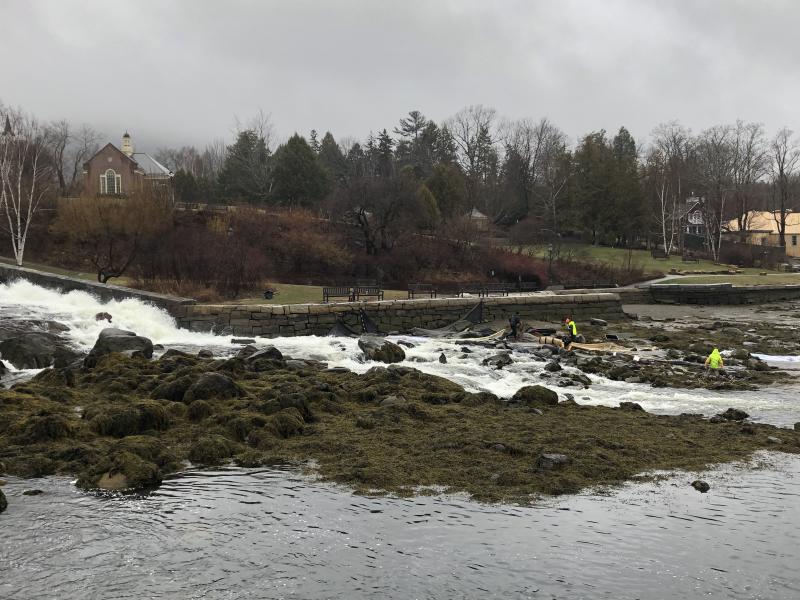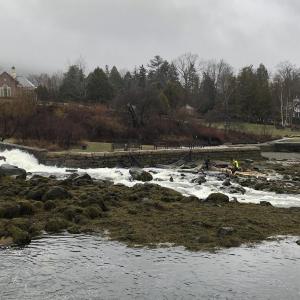Maine halts, and then restarts, elver season
PENOBSCOT BAY — Bright and early March 30, the fishermen who set nets in Maine’s coastal streams to catch elvers were hard at it, sinking large bags of sand to weigh down the gear, as strong currents of spring melt and rain coursed to the harbors.
This annual rite of spring for Maine, made exceptionally lucrative in recent years by Japanese, Chinese and Korean markets spending big money for the glassy eels, was almost sidetracked this season. On March 21, the Maine Department of Marine Resources had announced, in the name of public health, that the elver harvest season was delayed.
“Due to public health concerns associated with COVID-19, the Maine Department of Marine Resources has announced the closure of Maine's elver fishery, which had been scheduled to start Sunday, March 22,” the state said. “The closure, done through emergency rule-making, will be for a minimum of two weeks and will be reassessed at that time.”
But five days later, the DMR changed course and announced the elver season would be opening, after all, on March 30.
The glass eels are small, and in the spring, are returning from the Sargasso Sea — ocean spawning grounds — to Maine’s fresh water rivers. Many are intercepted, however, by net, and shipped overseas where they are raised in tanks to full size, and then eaten. They have become the most valuable marine resource in terms of price per pound for Maine.
“Commissioner Keliher had conversations with Tribal [Maliseet, MicMac, Passamaquoddy and Penobscot] and industry leadership, as well as Marine Patrol to develop a plan to reduce the population of harvesters congregating on the shores and at dealers shops,” said DMR spokesperson Jeff Nichols, on March 31. “The plan allows those license holders who are the most vulnerable to COVID-19 to stay at home and have another harvester catch and sell their elvers for them. The plan also includes protocols that dealers agreed to. These include limiting each transaction to one pound or more. This will eliminate hundreds of transactions over the course of the season and further reduce the potential to spread the virus.”
This is accomplished by applying for a temporary medical transfer that permits the holder of an elver fishing license to transfer the entire annual quota allocated to that person to another person holding an elver fishing license.
Under “the authority established by Governor Janet Mills' March 15 Civil Emergency Proclamation, licensed elver harvesters may fish for and sell the quota of another licensed harvester. Dealers have also agreed to limit transactions significantly by only buying one pound or more of elvers.”
As for the Marine Patrol officers and their need for personal protection equipment (PPE) while overseeing the 2020 Maine elver harvest catch (Marine Patrol officers are on scene at the various landing check-points, often in garages, warehouses and other tightly confined spaces), Nichols said: “Marine Patrol command staff is making every effort to provide personnel the appropriate PPE and will continue to do so as this issue evolves. Marine Patrol personnel are also expected to follow all CDC guidelines, including social distancing, in order to protect both our officers and the public.”
The social distancing, as required by the Governor’s order, means a minimum of six feet of space between people at all times, fishing and selling.
“Elver dealers have developed and agreed on a specific set of protocols for elver sales transactions, that are designed to minimize the risk of the spread of COVID-19 and are consistent with CDC guidelines,” said the DMR. “These include limiting each transaction to one pound or more. This will eliminate hundreds of transactions over the course of the season and further reduce the potential to spread the virus. Harvesters are expected to comply with the protocols specified by the dealers.”
As for the sustainability of the elver population itself, the DMR said the state’s overall quota – 9,641 pounds, as well as the associated quota for individuals, has not changed, and “the swipe card system will be used to ensure that harvesters and those for whom they harvest and sell do not exceed their allotted quota.”
In 2019, the approximate 1,100 elver harvesters fished 4.36 metric tons from Maine waterways. That represented a combined monetary value of $21 million, based on the going price of $2,000 per pound (far different from 1994 when the going price per pound was $55).
“Maine Marine Patrol will monitor the fishery to determine whether participants are following the necessary protocols,” warned Kelleher. “If I become aware that participants are not following protocols designed to keep all residents of the state of Maine safe, the fishery will be closed, said Commissioner Keliher. In addition, if Maine CDC guidance changes prior to the end of the season and it is not possible for the fishery to follow the new guidance, the fishery will be closed.”
He added: "Harvesters should take the opportunity to thank these individuals as it was their input that allowed us to reopen the fishery," said Keliher.
How is the market?
This year, on April 2, the DMR said that dealers reported buying a total of 46.455 pounds with a reported value of $23,507 for average price per pound of $506.
Last year, the season opened in on March 22, with the first report on March 24, and the average per pound price was $1,600.
To put it into larger perspective, however, the per pound price fluctuates, said Nichols. Ten years ago, it was $100 per pound; in 2014, $817 per pound.
“So we are still greater than we were 10 years ago,” said Nichols. “We are still considerably above the historic average, at least of recent years.”
Event Date
Address
United States
























